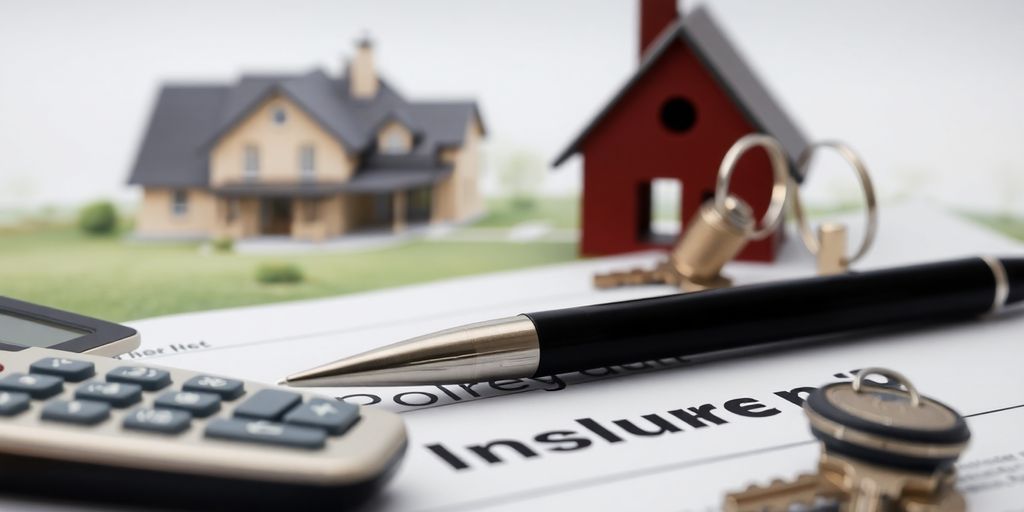Property Insurance for investors

So, you're thinking about investing in property, huh? Well, one thing's for sure, you need to think about insurance. Investment Property Insurance is like a safety net for your real estate ventures. It's not just for landlords or big-time investors; it's for anyone looking to protect their assets. This guide will walk you through the ins and outs of getting your property insured, the benefits, and even some common misconceptions people have. Let's get into it and make sure you're covered from all angles.
Key Takeaways
- Investment Property Insurance is essential for protecting your real estate investments from unforeseen events and liabilities.
- This type of insurance covers legal expenses, property damage, and liability claims, providing peace of mind to property owners.
- While not legally required, having this insurance is highly recommended to safeguard against potential financial losses.
- The cost of Investment Property Insurance varies based on factors like property location, coverage limits, and claims history.
- Understanding the application process and choosing the right coverage can help you get the best protection for your needs.
Understanding Investment Property Insurance

What Is This Magical Coverage?
Alright, picture this: you've got this shiny investment property, maybe a cozy duplex or a sleek office space. Now, imagine someone slips on a banana peel in the hallway. Who's gonna pay for that? Enter Investment Property Insurance, your trusty sidekick. It's like a superhero cape for your property, protecting you from financial disasters like lawsuits, property damage, or even a tenant's wild party gone wrong.
Why Do You Need It?
You might be thinking, "I'm a careful person, why would I need this?" Well, accidents happen. You can't control everything, like that tree branch deciding to crash through the roof during a storm. Investment Property Insurance is your financial safety net, covering unexpected expenses that could otherwise drain your wallet faster than you can say "emergency fund."
The Fine Print: What’s Not Covered?
Before you start dreaming of a worry-free landlord life, let's talk about the fine print. Insurance isn't a magic wand for everything. Typically, it won't cover things like wear and tear or that mold problem you've been ignoring. Also, if you're thinking about insuring against alien invasions, you might be out of luck. Always read the policy details, so you know exactly what's in and what's out.
"Insurance is like a parachute. If you don't have it when you need it, you might never need it again."
The Benefits of Investment Property Insurance
Protecting Your Wallet from Disaster
Alright, so imagine this: a tree decides it wants to go skydiving and lands smack dab on your rental property. Without investment property insurance, you’d be scrambling to cover the costs out of pocket. But with it? No sweat! This magical policy swoops in to save the day, covering those unexpected disasters that make you want to pull your hair out.
Here's a quick look at what might get covered:
- Property damage from natural disasters
- Vandalism or theft
- Loss of rental income due to covered damage
Legal Fees: The Uninvited Guest
Ever had a tenant who trips over their own shoelaces and decides it’s your fault? Yeah, it happens. Investment property insurance can help cover those pesky legal fees that sneak up on you like a ninja in the night. Whether it’s a slip-and-fall or a full-blown lawsuit, having this insurance means you’re not footing the bill for every court appearance.
"Having insurance is like having a trusty sidekick in a superhero movie. You might not always see them, but you sure are glad they’re there when things go sideways."
Peace of Mind: The Best Benefit
Let’s be real. The best part about having investment property insurance? Sleeping soundly at night knowing your assets are protected. It’s like having a cozy security blanket for your investments. You know that even if something goes wrong, you’re not going to be left in the lurch.
So, while you’re dreaming about your next big real estate venture, your insurance is hard at work, keeping everything safe and sound. Now, that's what I call peace of mind.
How to Get Your Investment Property Insured
The Application Process: Not as Scary as It Sounds
Alright, so you're ready to get your investment property insured. First things first, don't panic! The process isn't as terrifying as it seems. It's a bit like ordering a pizza—just with more paperwork and less cheese. Here's what you need to do:
- Gather Your Documents: You'll need details about your property, its value, and any current policies you might have. Think of it as prepping your ingredients before cooking.
- Contact an Insurance Agent: This is your friendly neighborhood guide to the world of insurance. They'll help you navigate the options and find what's best for you.
- Fill Out the Application: Yes, it's a form. Yes, it's boring. But hey, it's necessary. Provide all the details about your property and any potential risks.
- Review and Submit: Double-check everything. You don’t want any surprises later on, like an unexpected topping on your pizza.
Applying for insurance is like a first date—nerve-wracking, but worth it if you find the right match.
Choosing the Right Coverage: A Game of Insurance Tetris
Picking the right coverage is like playing Tetris. You need to fit all the pieces together perfectly. Here's how to make sure your policy is a winner:
- Assess Your Needs: What kind of property are you insuring? A rental, a fixer-upper, or maybe a commercial space? Each has different needs.
- Consider the Risks: Is your property in a flood-prone area? You might need flood insurance. Think about all possible hazards.
- Compare Policies: Don’t just pick the first policy you see. Compare different options like you would compare pizza toppings.
Getting a Quote: The Price is Right!
Now comes the fun part—finding out how much this is going to cost you. Getting a quote is straightforward, but here’s how to make it work for you:
- Provide Accurate Information: The more accurate your info, the more accurate your quote. It's like giving the pizza guy the right address.
- Ask for Discounts: Many insurers offer discounts for things like bundling policies. It’s like getting a free side of garlic bread.
- Review Your Quote: Look over the details. Are they offering you the right coverage for the right price? If not, keep shopping around.
Getting your investment property insured might seem like a big task, but with the right steps, it can be as easy as pie—or pizza! 🍕
Common Misconceptions About Investment Property Insurance

It’s Just for Landlords: Wrong!
If you think investment property insurance is only for landlords, think again! This type of insurance isn’t just about protecting rental income. It’s for anyone who owns property as an investment, whether you’re flipping houses or holding onto them for long-term appreciation. So, whether you’re a landlord, a flipper, or just someone who likes to collect properties like baseball cards, this insurance has your back.
I Don’t Need It Because I’m a Nice Person
Being a nice person doesn’t exempt you from accidents, unfortunately. You could be the kindest, most careful property owner out there, but that doesn’t stop a rogue tree branch from crashing through your window or a tenant from slipping on your freshly mopped floor. Insurance isn’t about how nice you are; it’s about being prepared for the unexpected.
Insurance is Too Expensive: Let’s Crunch Some Numbers
Sure, insurance costs money, but so does repairing a roof after a storm or dealing with a lawsuit because someone twisted their ankle on your property. Let’s break it down:
- Roof Repair: $5,000 - $10,000
- Lawsuit Settlements: $15,000 - $100,000
- Annual Insurance Premium: $800 - $2,000
See the difference? Paying for insurance might pinch your wallet a bit now, but it’s way cheaper than handling disasters out of pocket. Plus, many people mistakenly believe that all insurance policies offer the same coverage. In reality, there are significant differences in policies, particularly regarding tenant damage and lost rent, which may not be included.
Insurance is like a safety net for your investment. It’s there to catch you when life decides to throw a curveball. Don’t let misconceptions keep you from protecting your assets.
Filing a Claim: The Good, The Bad, and The Ugly

When to File: Don’t Wait for the Roof to Fall In!
Alright, so your investment property just had a run-in with a not-so-friendly storm, or maybe a tenant decided to throw a "rager" that went a little too wild. You might be thinking, "Should I file a claim?" Here's the deal: only file a claim for significant losses that could really mess with your finances. If your claim is for something small, it might just end up raising your rates, and nobody wants that! Claims should only be made for significant losses that would have a major financial impact. So, don't hold off too long—if the damage is big, get that claim rolling!
The Claims Process: A Journey Through Paperwork Hell
Filing a claim can feel like you're trying to solve a Rubik's Cube blindfolded. First, get all your ducks in a row: pictures, receipts, and any evidence that shows the damage. Then, brace yourself for the paperwork. Think of it as a treasure hunt, but instead of gold, you're after insurance money. Once you've submitted everything, it's a waiting game. Your insurance company will send out an adjuster to assess the damage. Keep your phone handy because you'll probably be playing phone tag with them for a bit.
What Happens After You File: Spoiler Alert, It’s Not a Movie
Once your claim is in, it's time to sit back and let the insurance folks do their thing. They'll review all the info you've sent and, if all goes well, you'll get a payout. But don't pop the champagne just yet! Sometimes, the payout isn't exactly what you were hoping for. If that happens, you might need to negotiate or even get a second opinion. Remember, patience is key here. It might not be as fast as a pizza delivery, but hang in there, and you'll hopefully get what you need to fix up your property.
Tips for Lowering Your Investment Property Insurance Costs
Bundling Policies: The Insurance Two-for-One Sale
Why settle for one insurance policy when you can bundle and save? It's like the BOGO of the insurance world. By combining your investment property insurance with other types, like Errors & Omissions Insurance, you might just surprise yourself with how much you save. This is not just a gimmick; it’s a legit way to cut costs. Plus, it means fewer bills to keep track of—who doesn’t love that?
Increasing Your Deductible: A Risky Business
Feeling a bit daring? You might want to consider upping your deductible. Sure, it sounds risky, but it’s a classic move to lower your premium. Think of it as betting on yourself—you’re hoping you won’t need to file a claim anytime soon. But hey, if you’re confident in your property's resilience, this could be a smart play.
Regular Property Maintenance: Your Insurance’s Best Friend
Keeping your property in tip-top shape isn’t just about curb appeal; it’s about keeping your insurance costs down. Regular maintenance can prevent those pesky claims that make your premiums skyrocket. Fix that leaky roof, trim those overgrown trees, and keep that plumbing in check. A well-maintained property is less likely to suffer from costly damages, which means lower insurance costs for you.
"Maintaining your property is like flossing—annoying but totally worth it in the long run."
The Future of Investment Property Insurance
Trends to Watch: What’s Coming Next?
Okay, let’s peek into the crystal ball of investment property insurance. Spoiler: it’s not all doom and gloom! The market is buzzing with new trends. First up, personalized policies. Forget one-size-fits-all. Insurers are crafting custom plans that fit your unique needs like a glove. Next, sustainability is king. Eco-friendly properties might soon score you some sweet discounts. And let’s not ignore the rise of data-driven decisions. Insurers are using big data to predict risks better than ever.
Technology and Insurance: A Match Made in Heaven?
Tech is shaking things up in the insurance world. Imagine filing a claim with just a few taps on your phone. Yep, mobile apps are making the process smoother than ever. Then there's AI, which is helping assess damages faster than you can say "deductible." Drones? They're flying over properties to spot issues before they become costly problems. And let’s not forget blockchain—keeping your data secure and transparent.
The Impact of Climate Change: Not Just a Buzzword
Climate change isn’t just for scientists to worry about. It’s hitting your insurance premiums, too. With more severe weather events, insurers are adjusting their models to keep up. This means higher premiums for high-risk areas, but also new products to cover those unexpected disasters. Don’t get caught without coverage when the next big storm hits!
"The insurance game is changing fast, and if you’re not keeping up, you’re basically inviting chaos to your doorstep."
In short, the future of investment property insurance is as unpredictable as the weather, but with the right coverage, you can weather any storm. Just keep an eye on those trends, embrace the tech, and maybe consider an umbrella insurance policy to cover all bases!
As we look ahead, the world of investment property insurance is changing fast. It's important to stay informed about these changes to protect your investments. For the latest updates and tips, visit our website and join our mailing list today!
Wrapping It Up: The Wild World of Property Insurance
So, there you have it, folks! Property insurance for investors isn't just a fancy add-on; it's like that trusty umbrella you wish you had when the sky decides to open up. Whether you're dealing with a rowdy tenant or Mother Nature's mood swings, having the right coverage can save your bacon. And let's be honest, who doesn't want their bacon saved? It's all about peace of mind and keeping your investment safe from life's little surprises. So go ahead, get that insurance, and sleep like a baby knowing you're covered. Just remember, even the best insurance won't protect you from your neighbor's karaoke nights. Cheers to smart investing and even smarter insurance choices!
Frequently Asked Questions
What is Investment Property Insurance?
Investment Property Insurance is a type of insurance that protects property owners, like landlords and real estate investors, from financial losses due to accidents, damage, or legal issues on their properties.
Why do I need Investment Property Insurance?
Having Investment Property Insurance is important because it helps cover costs related to property damage, legal fees, and liability claims, protecting your financial investment.
What does Investment Property Insurance cover?
This insurance typically covers repairs for property damage, legal expenses if someone sues you, and medical costs if someone gets hurt on your property.
Is Investment Property Insurance expensive?
The cost of Investment Property Insurance varies based on factors like the property's location, size, and coverage amount. It's often affordable compared to the potential costs of not having it.
How can I get Investment Property Insurance?
You can obtain Investment Property Insurance by contacting an insurance provider who will guide you through the application process and help you choose the right coverage.
Can I lower the cost of my Investment Property Insurance?
Yes, you can often reduce costs by bundling policies, increasing deductibles, or maintaining your property well to minimize risks.
